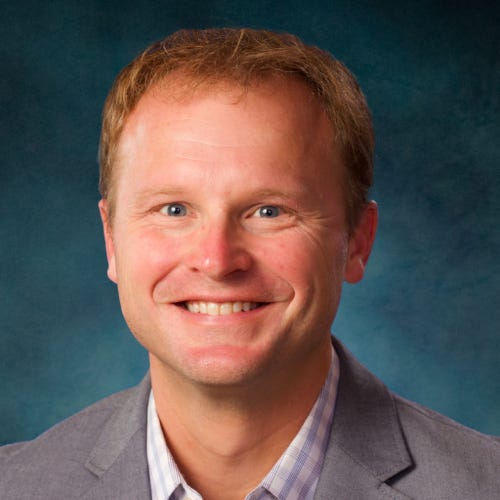Pastors & Exercise: An Interview with David Mathis
"A Little Theology of Exercise: Enjoying Christ in Body and Soul" by David Mathis is now available.
Brought to You With ❤️ by Kaywood’s Kitchen
New! Introducing Kaywood’s Kitchen, a new email newsletter started by my wife and I that exists to help you and your family get and stay healthy. You’ll find healthy recipes, food product recommendations, non-toxic swaps, and general health advice. And we’re just getting started. As one who is certified in Sports Nutrition and Personal Training certifications through the National Academy of Sports Medicine (N.A.S.M.), I’m passionate about health and nutrition. In particular, we want to help pastors and their families be as healthy as possible. So subscribe today if this sounds interesting to you.
Speaking of health, please enjoy this interview with David Mathis.
“Why would a pastor, of all people, write a book about exercise?”
It’s a good question. And it’s how David Mathis, executive editor for Desiring God and pastor at Cities Church in St. Paul, Minnesota, begins the introduction of his brand new book, A Little Theology of Exercise: Enjoying Christ in Body and Soul, which releases today from Crossway. The book explores the intersection of Christian faith and personal exercise. Writing about the body and exercise from a Christian perspective can be polarizing and even offensive. Still, Mathis handles an oft-neglected topic well, pleading with the reader to take up exercise for the cause of his or her joy in Christ.
Crossway was kind to send me an advance copy months ago, and Mathis was kind to accept my interview invitation for Pastors & Productivity. You can find our conversation below.

You are a pastor who lacks formal fitness credentials. So why did you write a book on exercise?
God made our bodies and souls, and they are deeply, enigmatically connected. The thoughts and affections of our inner persons profoundly affect our bodies, and what we do and don’t do with our bodies greatly affects our minds and hearts. Go without sleep for a night, and you quickly feel how much the body affects the soul. The body is not irrelevant to Christianity and pastoral ministry.
First, as a Christian myself, I’ve acutely experienced how much a modest pattern of exercise in my life for more than a decade (after many years of a sedentary lifestyle) has helped my soul — my mind, my heart, my faith, my will. As a pastor, I’ve also had the opportunity to share these truths with other 21st-century Christians, who encounter the same modern-day challenges, and who’ve expressed gratitude for help on a biblical perspective on the human body and its movement. This includes some practical-theological motivations to help us embrace the momentary discomfort of exercise for both the natural and spiritual joys we can experience through exercise as one aid among others.
What are the main biblical texts that provide a Christian defense for exercise?
First Timothy 4:8 is the text many expect to hear: “while bodily training is of some value, godliness is of value in every way.” Let’s get there eventually, but I start a few verses earlier with 1 Timothy 4:4–5. Paul is talking about life in the body — the dinner table and the marriage bed. As Christians, we’re not to go about these things mindlessly, whether like animals or like unbelievers, but we’re to consecrate or “make holy” these aspects of our bodily life. This is why many of us pause to pray over meals. We’re thanking God for his provision of food, and asking him to bless or consecrate the meal, to make it holy, for his good purposes in our lives. Praying over meals is a good practice, and it would be a good practice for other aspects of our bodily lives as well: the marriage bed, sleep, work life, and this modern phenomenon known as exercise (since many of our post-industrial work-lives no longer get us to the normal levels of human movement needed for health and wellness).
The first passage you’ll find in the book, and likely the most often repeated, is 1 Corinthians 6:19–20: “do you not know that your body is a temple of the Holy Spirit within you, whom you have from God? You are not your own, for you were bought with a price. So glorify God in your body.” That is very countercultural: “you are not your own”! And it’s amazing that Paul’s call here is not to get outside your body or despite your body or overcome your body, but to “glorify God in your body.” We glorify God, or not, in these bodies. Exercise, like sleep and eating, is one way among others in the modern world for glorifying God in our bodies, and conditioning the bodies in which we glorify him.
Now back to 1 Timothy 4:8, which is about “bodily training.” Paul himself and his readers two thousand years ago didn’t have cars and screens. They did manual labor; they were not “knowledge workers” like so many of us today sitting all day to peck at computers. Before we can even talk about Paul’s blessing of “bodily training” as “of some value,” many of us first need to restore normal human levels of bodily activity to our lives. This is what exercise does for most of us. For some, they then condition their bodies for running or strength or balance or some particular athletic skill. But for most of us, we’re just talking about getting normal human levels of physical activity to build and condition our brains and get our bodies in working (not world-class) order.
How does a Christian person exercise – or go about thinking about exercise– differently than an unbeliever?
That’s right, it begins with how we think about exercise. Our Creator tells us about himself and his world and why he made it and us and our bodies. To exercise like a Christian begins with receiving what God says about our bodies and their movement. And how we feel about what God says matters as well. The movements and motivations of our hearts make our exercise more or less Christian. Then, as noted above in 1 Timothy 4:4–5, an often overlooked aspect of exercising like a Christian is praying about and for our exercise. Do you pray about your exercise — whether you should supplement the bodily activity levels of your job with exercise or not? Or how often it would be good to exercise and for how long and where and with whom and what kind of exercises? I suspect that for many Christians, myself included, our default regarding exercise is far more like Nike’s slogan “Just do it” than Paul’s “Whether you eat or drink or whatever you do, do all to the glory of God.” Then it also would be Christian to pray for your exercise, like many of us pray for our meals. We thank God for his provisions and ask him to use this physical act for his good purposes in us and through us. It’s not only Christian to say grace before we eat but even before we exercise.
In A Little Theology of Exercise, you set forth five motivations for Christian exercise. Can you briefly mention each?
First is the glory of God, which you might expect — but it’s no less important for being expected. “Glorify God in your body,” says 1 Corinthians 6:20. But that’s a far more complex reality than we might assume at first glance. So, at least four other motivations are, I find, very helpful.
Second is joy. I’m a Christian Hedonist. I believe that God is most glorified in us when we are most satisfied in him. You cannot glorify God as he deserves if you don’t enjoy him as he deserves. Finding deep and enduring joy in God, deeper and more enduring than life’s sorrows and pains, is not optional in the Christian life but essential. I want to do what I reasonably can to be as happy in God as I can be. Regular exercise helps. I know exercise requires discomfort, but it’s not discomfort for its own sake but for greater joy on the other side.
Third is the health and clarity of my mind, or the brain. Perhaps the biggest payoff, humanly speaking, from exercising is not what it does for the body but the brain. This is one of the most fascinating discoveries for me in the last ten years.
Fourth, I talk about our wills and how exercise trains and conditions our wills. Which relates to a fifth and finally one: love. For Christians, exercising is not about looking good but doing good — that is, putting these bodies to work to meet the needs of others. Doing good works typically requires some work, some exertion of our bodies and expenditure of physical energy. As Christians, we want our bodies to be assets, not obstacles, in doing the good deeds to love and serve others that our Father calls us to, for his glory.
Many pastors believe they are too busy to exercise. They feel regularly inundated with work and always feel behind. As a result, exercise is an afterthought at best. How do you counsel this pastor? What types of exercise goals could a pastor have?
Dear brother pastor, your work is too important, and your God-given vessel too important (that is, your body and brain), to just let your body go. Now, if your life is relatively active, if you’re getting well over 10,000 steps per day, say, or working often with your hands, then you don’t need to exercise necessarily. But many of us pastors spend lots of time in front of these screens pecking at keys, or in FTF (face-to-face) meetings where we’re sitting down. 21st-century pastoral ministry is typically pretty sedentary work. And your mind and the clarity of your thinking and decision-making, and your joy in Jesus and joy for the work and heart to love and bless others, all that will benefit, I believe, from some modest pattern of activity in your life.
God made our bodies to move and be at their best and be at our happiest when we’re regularly moving. For pastors, I would not want this to land on you as some new obligation but a new opportunity. Let this help you put some boundaries in your life. Far too many pastors are too busy because they are choosing to take on too much. Put some non-negotiables in your life, like time for unhurried daily Bible meditation and prayer, enough time to produce quality time with your wife and kids, adequate sleep, and modest exercise. Do those things well, and at a pace where you can enjoy them, and you end up with a clearer sense of the limited number of hours you have in the week for doing the work of pastoral ministry. Use the increased clarity of thought you get from exercising to triage the 80 hours of work you could do and get it down to the forty or so hours of what’s really most important.
As for exercise goals, try to find what you enjoy doing. The recommendation of many doctors is pretty modest: walk for half an hour every other day. If you don’t have time for two hours of modest physical exertion each week, I suspect you’re making poor decisions with your time somewhere.
In preparing this interview, I reached out to my email subscribers of Pastors and Productivity and asked for questions for this interview. One pastor writes to me, “I have seen several marriages strained and even come to an end over affairs that developed from gym relationships. I . . . see the danger of the gym culture, both in affairs and in pride that develops in how someone starts looking and feeling.” He wants to know “how to protect Christians who find themselves in gyms.” Your response?
I don’t think you need a gym membership.
I’ve been exercising regularly now for more than ten years and never had one. In fact, resolving to exercise without the extra hassle of commuting to a gym helped tip the scales for me ten years ago. I live in Minnesota, so I get that you have to find indoor space to survive the winter (or the height of summer, in some places). I did run a used treadmill into the ground and then bought one for our basement several years ago. We have some weights in our basement now as well. Over time, we would have put far more money into a gym membership than we have acquired for our basement. Mainly I run outside most of the year. So, I don’t know gym culture, but I think pastors should be able to figure this out. If you need a gym, perhaps you need a workout buddy too, or go with your wife.
As for pride, that’s a danger for all of us. Oh how deceitful our human hearts can be. We lose ten pounds and can think we look better than we do. Brother preacher, you’re no Adonis and you can take joy in being very normal and humble. In fact, consider your calling, brothers: not many of you were impressive according to worldly standards, not many were strong, fast, handsome. But God chose what is weak in the world to shame the strong. Pray that God would keep your heart, and that your modest amount of exercise would not aim at looking good but doing good.
In your book, I got the impression that you run in the mornings, but that’s all I picked up on. Can you explain your exercise routine?
My own routine doesn’t matter much. It’s very unimpressive. I do run. Running’s efficient. I can get in a lot of steps in 25 minutes, and enjoy the “persistence high” (formerly known as “runner’s high”) from enduring in strenuous activity for more than twenty minutes. As a young dad, I did not have time to drive to and from a gym, and I didn’t want to pay for a gym. It was and continues to be cheap and quick to run or walk outside.
I play basketball with some men on Tuesday mornings early. I also do some baseball activities here at there with my twin sons who play baseball. In recent years, I’ve added some minimal resistance training (weights, pushups, pullups). I keep using the word modest for a reason. I’m not calling on pastors to be bodybuilders or triathletes. If I run four times in a given week, that’s about two hours total. My weights would be less than an hour a week. If I play basketball, that’s about 75 minutes. Add it all up, and that’s 30 minutes/day max for me, and it’s plenty to unleash the cascade a good benefits for my body and soul through exercise. And it’s taken me ten years to work from no physical activity to an average of 30 minutes/day. Think big arc.
How has exercise served your joy in life and in ministry? How are you hoping pastors and other readers will respond to the message of your book?
On the one hand, the natural joy I get from exercise is not much more than a “boost” for the joy that really matters, that is, spiritual joy in Jesus. On the other hand, that boost can be so helpful. I don’t want my mind and heart hindered from experiencing the joy in Jesus I could because I’m so mistreating my body through lack of sleep, and bad eating, and sedentary living. Very practically, what keeps me putting on my running shoes and moving my legs and doing pull-ups is I want to be happy. I’m happier all day when I’ve exercised in the morning, and I’m happier in life when I have a pattern of regular exercise. On its own, that’s not enough. I want that joy to be Christian joy, that glories God and spills over in love for others.
I hope that fellow pastors, and other readers beyond, will find a new avenue (among others!) for seeking joy in God through a wise use of the physical bodies God gave them. Exercise does not replace God’s word and prayer and fellowship, but it can help my engagement in these means of God’s ongoing grace for the joy of the Christian life.




